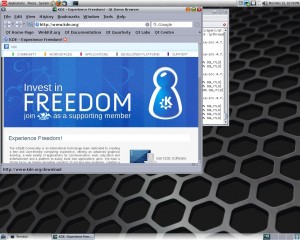Long-term Management
Thursday, February 3rd, 2011My friend Armijn sent me this, and asked if I would pass it on. He adds as a word of warning “this is a post that can easily ruin your mood“. I’m posting it here as well as on my new blog, as its theme is the future.
Almost all free software developers I have met are always very enthusiastic about their programs and what to add and improve in the future. Very few of them think what happens afterwards. With this I don’t mean what happens after those additions and improvements (your answer would probably be “more additions and improvements”), but I mean when there is no future. When you’re no longer coding. When your uplink is permanently disconnected. When you’re dead.
Planning for the inevitable is not something we want to think about (thinking about your own mortality is not many people do for fun), but it is something we need to do, all of us. I was remembered about this by two recent events. One was when at gpl-violations.org we got a report about a violation in the Apple AppStore. Since I had already dealt with the same developer in the past (it was resolved very amicably) I decided to connect the reporter directly with the developer. The reporter got an unexpected surprise in the form of an e-mail from the developer’s father who said that his son had died half a year ago and he could not get himself to pull the app from the App Store, as a tribute to his son. Eventually we got sources when one of the developer’s friends (another engineer) was involved to lift the sources from the deceased developer’s laptop.
Another example was when a webmaster of a website that my dad regularly contributed to, died in a fire in his house. The website contained many years of research, at least 10 years, but possibly many more. Many people had contributed to this research, but the data was only available through the website. The database itself was hosted on baseportal.com which allows people to have a free database. How to get the data back, especially someone else’s data is completely unclear. At the moment people are trying to reach the heirs of the webmaster so they can salvage the data and make sure the webpage continues as a tribute to the original webmaster.
The common theme is that these people were very passionate about what they did. They truly loved their work and it work was appreciated by many. But when fate struck it turned out that they had not taken care of what would happen after they would pass away. I am very sure that they didn’t expect this to happen so soon, or never realized that this could be an issue. But in the digital world, with lapsing domain name registrations, databases and webspace being deleted because of unpaid bills, offline development trees and uninformed heirs this is becoming more and more of a risk.
So, what can you do prevent this from happening with your code and data? First, move your development as much online as possible. The KDE project has great infrastructure for this. Second, think about assigning your copyright to KDE e.V. with the FLA. If you don’t want to do this, make sure that your heirs know what you have been doing with free software and what they can and cannot do with the code. Show them that you care a lot about this.
Don’t let this story scare you too much. Keep coding, with passion, knowing that if you have taken the right measures your code will live on and will (hopefully) be used, reused and adapted by many people, even after you are no longer here.
— Armijn
(As a closing note, the FLA that KDE e.V. uses was developed by the FSFE.)
